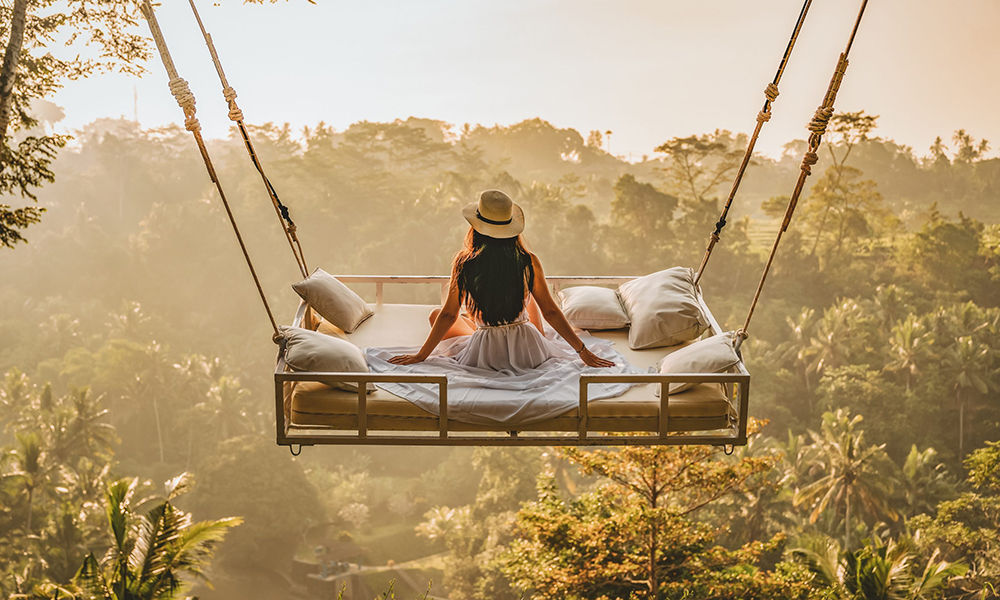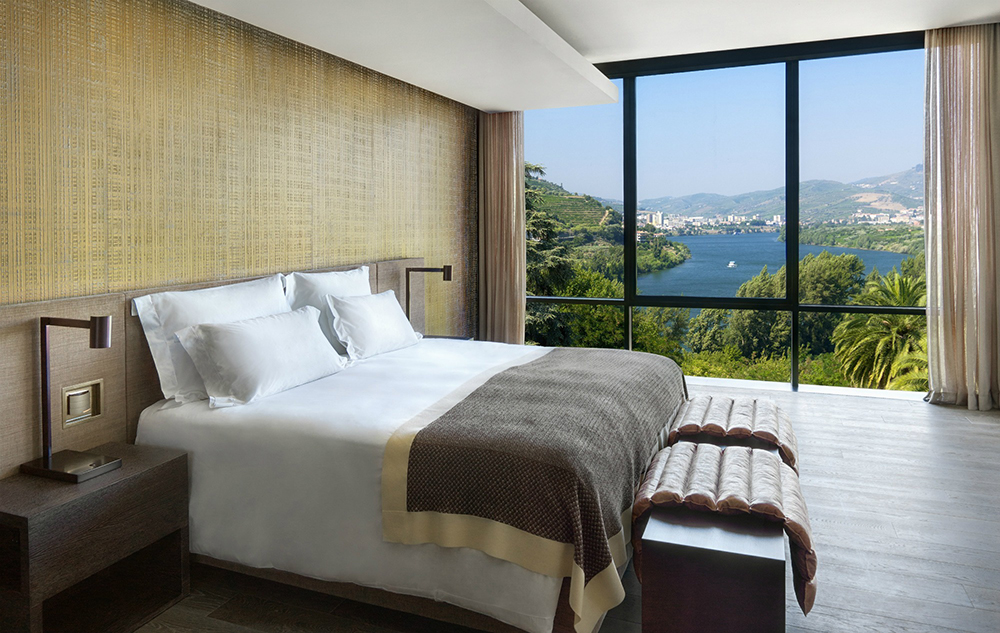
如今,有越来越多的旅行者放弃了从早到晚排满各种活动的行程。相反,他们会咨询酒店的枕头菜单,把就寝时间提前。
“好眠旅游”时代来临,越来越多的酒店提供各种便利设施和服务,包括内部睡眠专家,以帮助顾客实现健康的休息。HTF Market Intelligence的分析显示,从2023年到2028年,好眠旅游市场的规模预计将增长近8%,超过4,000亿美元。
哈佛大学(Harvard University)睡眠医疗科(Division of Sleep Medicine)的睡眠科学家、《睡出成功》(Sleep for Success!)的作者之一瑞贝卡·罗宾斯表示:“顾客越来越重视旅游期间的睡眠质量,希望在旅途中能够得到优质睡眠。”
“慢旅行”的日益走红,刺激了健康旅游业的发展,该行业的规模达到8,140亿美元,而且还在不断壮大。所谓“慢旅行”,是指为了休息放松和重新养成健康习惯而旅行。在最近的一项调查中,绝大多数(超过94%)受访者称,他们希望体验慢旅行。与此同时,全球越来越多的酒店正在变成好眠旅游的宣传大使,它们为顾客提供睡眠跟踪器、安静的居住环境和睡眠医生的指导。
罗宾斯说:“外出旅行,最后带着一身疲惫回家的日子将一去不复返。旅行可以让人精神焕发,从认知上学习和体验新事物,从身体和心理上得到必要休息,让你精力充沛地旅行,并以放松的状态回家,这是一种真正令人兴奋的理念。”
在对600多名旅行者进行的调查中,罗宾斯发现只有三分之一的旅行者对上次旅行中的睡眠感到满意。罗宾斯在索内斯塔酒店(Sonesta)教授睡眠学。“最重要的调查结果是,旅行途中的睡眠状况是预测顾客再次光临概率的重要指标。”
罗宾斯指出,虽然酒店通常专注于宣传丰富的夜生活和餐厅,但它们还能够从旅行者对改善睡眠的渴望和需求中受益。她说:“毕竟,酒店是提供良好夜间休息的主要场所。”
好眠旅游热点
长期以来,酒店一直提供眼罩、遮光窗帘和舒适的枕头等便利设施,但许多品牌正在扩大各种促进睡眠的服务。希尔顿(Hilton)的健康副总裁阿曼达·阿尔-马斯里表示,有多家希尔顿酒店提供“助眠”便利设施,包括可调温床垫和暗光灯设置。

阿尔-马斯里说:“我们深知能否一夜好眠将决定一次旅行的成败,而且还可以带来提升创造力、改善情绪和大脑健康等积极效果。”她指出,希尔顿最近的健康趋势报告发现,人们旅行的首要原因是通过休息补充精力。
其他希尔顿酒店也在增加类似的助眠服务。罗马卡瓦列利华尔道夫酒店(Rome Cavalieri, A Waldorf Astoria Hotel)为顾客提供枕头菜单,巴厘岛康莱德酒店(Conrad Bali)则提供一种额外付费体验SWAY,顾客能够躺在吊床上享受60分钟助眠治疗。

阿尔-马斯里称:“参与好眠旅游的旅行者,愿意多花一些功夫寻找这种独特的体验、便利设施和环境,帮助他们实现睡眠和休息的目标。”
纽约柏悦酒店(Park Hyatt New York)提供900平方英尺(约83.61平方米)的布莱特恢复性睡眠套房(Bryte Restorative Sleep Suite),房间内有人工智能驱动的智能床,可以调整床垫的压力点,还有精油香薰器和睡眠相关的图书。伦敦Zedwell酒店提供的隔音房间,没有电视和显示器的干扰。纽约四星级本杰明皇家酒店(Benjamin Royal)的索内斯塔“休息与恢复”项目提供的睡眠套装中包括眼罩、催眠曲库、白噪声设备、10种枕头选择和强大的休憩套装。
对于想要把整个旅程用于改善健康的旅行者,六善酒店(Six Senses)为顾客提供精心设计的睡眠计划。六善酒店的业务遍布全球,包括希腊、印度和斐济。该酒店提供的服务包括睡眠冥想和两晚睡眠跟踪器,提供有关睡眠时长和质量的见解,并有内部睡眠医生提供指导。该酒店5晚的价格超过1,000美元,顾客通常会停留3晚至10晚。

睡眠教育受到重视
罗宾斯表示,困扰许多人的集体睡眠流行病令人担忧,因为优质的睡眠始终是身心健康的重要支柱。三分之一的成年人每晚的睡眠没有达到建议的睡眠时长,无时无刻不在的技术和焦虑、抑郁等心理健康问题的日益增加,会让人们难以入眠。
罗宾斯指出,这种差异揭示了一个更大的问题,那就是睡眠科学教育不足。她说:“事实上并没有正规的睡眠科学教育。这是一个能够改善集体睡眠健康状况的巨大机会。”
对许多人而言,假期就是优先考虑睡眠质量的最好时机。有机会旅行的人们可以利用便利设施,改善睡眠质量和睡眠时长,包括遮光的厚窗帘、无干扰的房间和帮助放松的资源等,例如正念指南。
如果旅行者旅行结束后感觉精力充沛,他们就能够把旅行中学到的技能应用到忙碌的日常生活当中。(财富中文网)
译者:刘进龙
审校:汪皓
如今,有越来越多的旅行者放弃了从早到晚排满各种活动的行程。相反,他们会咨询酒店的枕头菜单,把就寝时间提前。
“好眠旅游”时代来临,越来越多的酒店提供各种便利设施和服务,包括内部睡眠专家,以帮助顾客实现健康的休息。HTF Market Intelligence的分析显示,从2023年到2028年,好眠旅游市场的规模预计将增长近8%,超过4,000亿美元。
哈佛大学(Harvard University)睡眠医疗科(Division of Sleep Medicine)的睡眠科学家、《睡出成功》(Sleep for Success!)的作者之一瑞贝卡·罗宾斯表示:“顾客越来越重视旅游期间的睡眠质量,希望在旅途中能够得到优质睡眠。”
“慢旅行”的日益走红,刺激了健康旅游业的发展,该行业的规模达到8,140亿美元,而且还在不断壮大。所谓“慢旅行”,是指为了休息放松和重新养成健康习惯而旅行。在最近的一项调查中,绝大多数(超过94%)受访者称,他们希望体验慢旅行。与此同时,全球越来越多的酒店正在变成好眠旅游的宣传大使,它们为顾客提供睡眠跟踪器、安静的居住环境和睡眠医生的指导。
罗宾斯说:“外出旅行,最后带着一身疲惫回家的日子将一去不复返。旅行可以让人精神焕发,从认知上学习和体验新事物,从身体和心理上得到必要休息,让你精力充沛地旅行,并以放松的状态回家,这是一种真正令人兴奋的理念。”
在对600多名旅行者进行的调查中,罗宾斯发现只有三分之一的旅行者对上次旅行中的睡眠感到满意。罗宾斯在索内斯塔酒店(Sonesta)教授睡眠学。“最重要的调查结果是,旅行途中的睡眠状况是预测顾客再次光临概率的重要指标。”
罗宾斯指出,虽然酒店通常专注于宣传丰富的夜生活和餐厅,但它们还能够从旅行者对改善睡眠的渴望和需求中受益。她说:“毕竟,酒店是提供良好夜间休息的主要场所。”
好眠旅游热点
长期以来,酒店一直提供眼罩、遮光窗帘和舒适的枕头等便利设施,但许多品牌正在扩大各种促进睡眠的服务。希尔顿(Hilton)的健康副总裁阿曼达·阿尔-马斯里表示,有多家希尔顿酒店提供“助眠”便利设施,包括可调温床垫和暗光灯设置。
阿尔-马斯里说:“我们深知能否一夜好眠将决定一次旅行的成败,而且还可以带来提升创造力、改善情绪和大脑健康等积极效果。”她指出,希尔顿最近的健康趋势报告发现,人们旅行的首要原因是通过休息补充精力。
其他希尔顿酒店也在增加类似的助眠服务。罗马卡瓦列利华尔道夫酒店(Rome Cavalieri, A Waldorf Astoria Hotel)为顾客提供枕头菜单,巴厘岛康莱德酒店(Conrad Bali)则提供一种额外付费体验SWAY,顾客能够躺在吊床上享受60分钟助眠治疗。
阿尔-马斯里称:“参与好眠旅游的旅行者,愿意多花一些功夫寻找这种独特的体验、便利设施和环境,帮助他们实现睡眠和休息的目标。”
纽约柏悦酒店(Park Hyatt New York)提供900平方英尺(约83.61平方米)的布莱特恢复性睡眠套房(Bryte Restorative Sleep Suite),房间内有人工智能驱动的智能床,可以调整床垫的压力点,还有精油香薰器和睡眠相关的图书。伦敦Zedwell酒店提供的隔音房间,没有电视和显示器的干扰。纽约四星级本杰明皇家酒店(Benjamin Royal)的索内斯塔“休息与恢复”项目提供的睡眠套装中包括眼罩、催眠曲库、白噪声设备、10种枕头选择和强大的休憩套装。
对于想要把整个旅程用于改善健康的旅行者,六善酒店(Six Senses)为顾客提供精心设计的睡眠计划。六善酒店的业务遍布全球,包括希腊、印度和斐济。该酒店提供的服务包括睡眠冥想和两晚睡眠跟踪器,提供有关睡眠时长和质量的见解,并有内部睡眠医生提供指导。该酒店5晚的价格超过1,000美元,顾客通常会停留3晚至10晚。
睡眠教育受到重视
罗宾斯表示,困扰许多人的集体睡眠流行病令人担忧,因为优质的睡眠始终是身心健康的重要支柱。三分之一的成年人每晚的睡眠没有达到建议的睡眠时长,无时无刻不在的技术和焦虑、抑郁等心理健康问题的日益增加,会让人们难以入眠。
罗宾斯指出,这种差异揭示了一个更大的问题,那就是睡眠科学教育不足。她说:“事实上并没有正规的睡眠科学教育。这是一个能够改善集体睡眠健康状况的巨大机会。”
对许多人而言,假期就是优先考虑睡眠质量的最好时机。有机会旅行的人们可以利用便利设施,改善睡眠质量和睡眠时长,包括遮光的厚窗帘、无干扰的房间和帮助放松的资源等,例如正念指南。
如果旅行者旅行结束后感觉精力充沛,他们就能够把旅行中学到的技能应用到忙碌的日常生活当中。(财富中文网)
译者:刘进龙
审校:汪皓
More travelers are forgoing itineraries jam-packed with activities from dawn to dusk. Instead, they’re consulting pillow menus and retiring on the early side.
Welcome to the age of sleep tourism, where a growing number of hotels are offering amenities and services, including access to a slate of in-house sleep experts, to help guests get a healthy dose of rest. The sleep tourism market is estimated to grow by nearly 8% and by over $400 billion between 2023 and 2028, according to an analysis by HTF Market Intelligence.
“Guests are increasingly valuing sleeping when they’re traveling and getting a good night’s rest on the road,” says Rebecca Robbins, a sleep scientist at Harvard’s Division of Sleep Medicine and co-author of Sleep for Success!.
The growing $814 billion wellness tourism industry has capitalized on an overwhelming interest in “slow travel”—voyaging for relaxation and reconnecting with wellness habits. In one recent survey, a vast majority of respondents—over 94%—said they want to experience slow travel. This comes as more hotels across the globe are becoming ambassadors in sleep tourism, offering sleep trackers, retreats and guidance from sleep doctors.
“Gone are the days of traveling and coming home exhausted,” Robbins says. “The idea that travel could restore you—to cognitively learn things and experience new things and also physically and mentally get the rest you need to power your trip and to allow you to return home rested—is a really exciting proposition.”
In a survey of over 600 travelers, Robbins, who also teaches sleep science classes at Sonesta hotels, found only one in three were satisfied with their sleep during their last travel experience. “One of the most important outcomes from that study found that sleeping while traveling was a significant predictor of the likelihood a guest would return.”
Robbins says while hotels often focus on promoting their nightlife options and restaurants, they can also benefit from travelers’ desire and need to improve their sleep. “After all, hotels are the core provider of a good night’s rest,” she says.
Sleep tourism hot spots
Hotels have long provided amenities like masks, blackout shades, and comfortable pillows, but many brands are expanding their suite of sleep-boosting offerings. Several of Hilton’s locations offer “power down” amenities, including temperature-adjusting mattresses and dim light settings, according to Amanda Al-Masri, the vice president of wellness at Hilton.
“We know a good night’s rest can make or break a trip as well as provide major positive benefits for creativity, mood, and brain health,” says Al-Masri, who notes that Hilton’s latest wellness trends report found the number one reason for travel is to rest and recharge.
Other Hilton properties are similarly expanding their sleep-boosting services. The Rome Cavalieri, A Waldorf Astoria Hotel, offers guests pillow menus, while Conrad Bali has an additional paid experience called SWAY, where guests enjoy a 60-minute sleep therapy session while suspended in cocoon hammocks.
“Travelers engaging in sleep tourism are taking that extra step and seeking out unique experiences, amenities, and environments that help them achieve their sleep and relaxation goals,” says Al-Masri.
Park Hyatt New York offers a Bryte Restorative Sleep Suite, a 900-square-foot room with an AI-powered smart bed to adjust mattress pressure points. The room also has essential oil diffusers and sleep-related books. London-based hotel Zedwell offers soundproof rooms free of distractions like TVs and monitors. Sonesta’s Rest & Renew program at the four-star Benjamin Royal in New York offers sleep kits with masks, a sleep lullaby music library, white noise machines, ten different pillow options, and a power napping kit.
For those who want to dedicate their entire getaway to wellness, Six Senses, with locations across the globe, including in Greece, India, and Fiji, gives guests a curated sleep program. The stay includes sleep meditations and a two-night sleep tracker, providing insights into sleep duration and quality, along with guidance from in-house sleep doctors. A five-night stay starts at over $1,000, and guests can typically go from three to 10 nights.
The prioritization of sleep education
Robbins says the collective sleep epidemic plaguing many is cause for concern as optimal sleep remains a vital pillar of healthy physical and mental well-being. One in three adults do not get the recommended hours of sleep each night, perpetuated by 24/7 technology and the rise in mental health conditions like anxiety and depression that can keep people awake.
The discrepancy paints a larger picture highlighting the undereducation in sleep science, Robbins says. “There’s really no formal education,” she says. “There’s a tremendous opportunity to improve our collective sleep health.”
For many, there’s no better time to prioritize sleep than on vacation. For those who can access them, amenities that can help improve sleep quality and duration include thick curtains to block out light, a distraction-free room, and resources on wind-down routines such as mindfulness guides.
Travelers who return feeling rejuvenated just may use what they learned in their daily life once the hustle commences.






